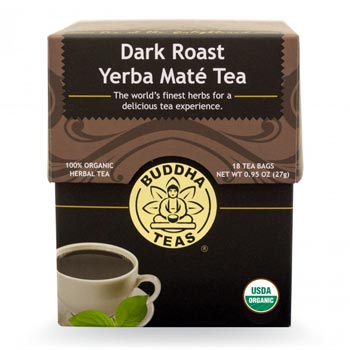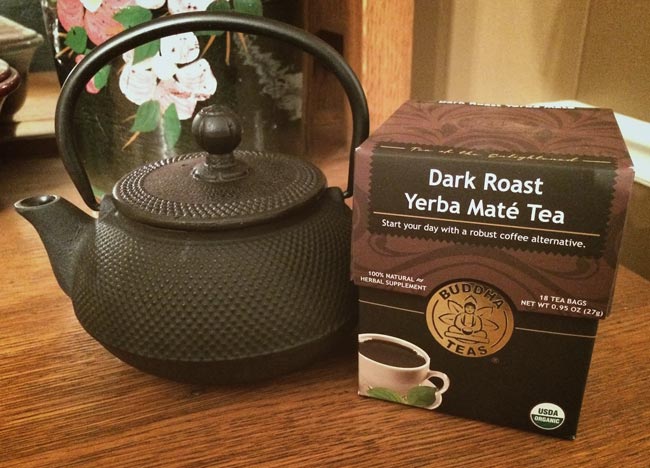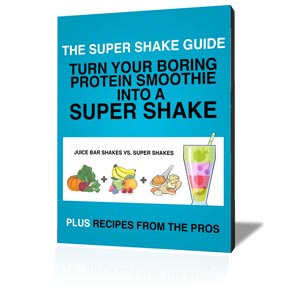Thanks to Buddha Teas for the tea to try and sponsoring this post!
Have you ever tried to recreate a restaurant favorite at home? I find it rarely goes well. My last attempt at deep dish pizza was a complete bust. My sweet potatoes fries, while tasty, never taste like the ones from my favorite local Peruvian restaurant, Café Cusco.
Another favorite from Café Cusco that didn’t go well at home is yerba mate. Yerba mate is an herbal yet caffeinated tea (tisane if you wish to get technical) native to South America. Brian saw it all over the streets of Buenos Aires, people sipping their yerba mate out of funny little gourds with a metal straw. He even brought me a bag of yerba mate home last summer, going out of his way to ask a local what brand was the most popular.
I can’t imagine how what he bought was the most popular. It was bitter, making the first cup a bit unpleasant. Adjusting my water temperature helped but it still required some stevia to help it go down. I was glad to finish off the bag. Not every tea is for everyone, I told myself.
Then I visited Café Cusco for the first time. I ordered a different kind of tea but the server suggested I try the yerba mate. I relayed my experience and he let me in on the secret to a pleasant cup of yerba mate– you have to get it roasted. On my next visit I decided to give it another go. I am so glad I did! The somewhat woody taste was still there but the bitterness was gone. The tea was smoky, a bit like a good pu-erh yet not as earthy. Every visit since then has started with a cup.
Once I understood what a good yerba mate should taste like I wanted to give it another go at home again. Since I am on a budget, I was hesitant on which brand to buy. The yerba mate varieties I found at my usual tea spots didn’t indicate anything about being roasted. I was confused and unsure. I did what most people do in such a situation – NOTHING.
Then I got a message form the team at Buddha Teas. I had been following them on Instagram for some time and had commented on a few posts. They asked me if I would be interested in sampling some of their tea. They gave me a couple of choices, one of which was a DARK ROASTED yerba mate. Here was my chance to try to find a yerba mate I could enjoy at home!
I waited to try the yerba mate till a Saturday morning when I could sit and (hopefully) savor the flavor. But wait…can I take a minute before we talk about the taste? Look at the box. The design is just beautiful. I love a company that takes pride in how it’s product looks and functions. It comes in a bleach free bag meaning less chemical exposure to you but no need for a tea strainer. All Buddha Teas products are GMO free with no artificial flavors or colors (you would be surprised how many tea brands add these).
Now let’s get back to taste. I followed the instructions on the label and let the tea steep for about 5 minutes. The aroma was gorgeous and bold. The first sip was delightful. It was rich and woody, a perfect compliment to my poached egg on crispbread breakfast. This unique flavor and moderate caffeine content (averaging 80-100 mg of caffeine per cup) makes yerba mate an excellent “transition tea” for those who wish to give up or reduce their coffee consumption. It’s enough to perk you up but perhaps not enough to make you jittery.
I enjoyed it “to the last drop”, just like I do when I am sitting at Café Cusco. When I was done, I was energized to start my day but centered at the same time. Isn’t that the perfect way to start the morning? And it’s easier (as well as less expensive) than visiting Café Cusco when I want a good yerba mate.
Have you tried yerba mate? What was your experience?
This is a sponsored post written by me on behalf of Buddha Teas.




